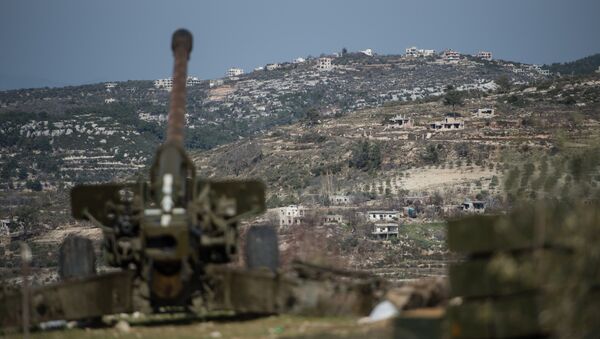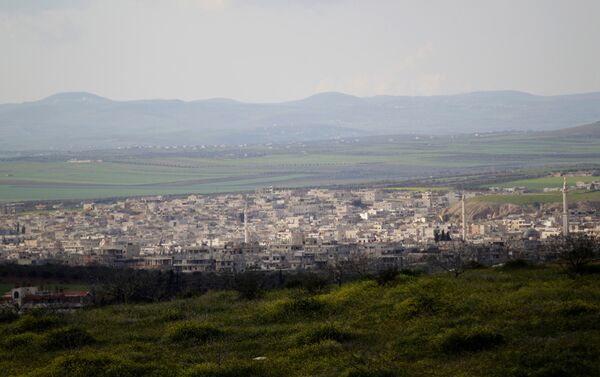The US Air Force’s recent strikes in Idlib Province coincided with the suspension of Russian and Syrian air operations in the de-escalation zone. The Russian Ministry of Defence sounded the alarm over Washington’s failure to forewarn the ceasefire guarantors, Moscow and Ankara, about the aerial operation thus endangering the truce.
"The US does not want the conflict in Idlib to go according to Russia's scenario", says military analyst and retired Lebanese Army General Amin Hteit. "The Americans struck Idlib in order to disrupt the Sochi agreement and prolong the military conflict".
"Russia is seeking to destroy the al-Nusra Front* and put the region under Turkish surveillance", Hteit elaborates. "In the future, Idlib will be controlled by the forces which accept a political settlement".
According to the retired general, "there are fears that American intervention will interfere with the Russian-Turkish plan to resolve the situation in Idlib".
"These attacks could disrupt the ceasefire, because terrorists will attack the positions of the Syrian Army in response, while [the Syrian government forces] will also retaliate", Hteit foresees.
On Saturday, the US Central Command reported that the American Air Force had attacked al-Qaeda-linked targets in Idlib.
"The removal of this facility will further degrade their ability to conduct future attacks and destabilise the region”, said US Central Command spokesman Lt. Col. Earl Brown as cited by the news agency AFP.
Prior to the strikes, Damascus notified all warring parties about a new ceasefire agreement brokered by Russia and Turkey earlier last week. According to the Russian Defence Ministry's Centre for Reconciliation, the Syrian government forces had met the conditions of the truce suspending all flights in the area. This step was supposed to allow Syrian civilians to flee Idlib through humanitarian corridors.
"Inconsistent and contradictory steps that the United States makes in Idlib cannot but cause bewilderment and concern", the Russian Defence Ministry stated on 2 September, stressing that while the US had repeatedly called to halt escalations in Idlib, the Pentagon had kicked off an air campaign in the area once the ceasefire had come into force.
As the Russian Defence Ministry noted Monday, a moratorium on military campaigns is still in place despite the US strikes. Nevertheless, the ministry's centre for Syrian reconciliation outlined that members of illegal armed groups had violated the ceasefire regime in 20 areas of Syria's Idlib de-escalation zone.
Syrian Army Liberating Idlib Province Step by Step
Idlib Province is home to around 30,000 jihadists, most notably Hayat Tahrir Al Sham*, an umbrella terrorist organisation led by the former al-Qaeda affiliate al-Nusra Front*. The terrorist group has maintained control over the province since 2015 carrying out subversive operations in the province and beyond.
In the summer of 2018, Moscow and Tehran voiced the necessity of launching an offensive in order to expel Islamist militants from the province. However, Turkey opposed the move citing the threat of a new refugee crisis. On 17 September 2018, Russia and Turkey held a meeting in Sochi and reached an agreement to create a de-escalation zone in Idlib Governorate.
On 2 August, Russia, Turkey, Iran and representatives of the Syrian oppositions held talks in Kazakhstan’s capital Nur-Sultan, formerly Astana, to step up efforts to prevent civilian casualties in the region.
Although the parties concerned declared the first truce in early August, the jihadi groups failed to observe the conditions of the agreement prompting the Syrian Army offensive on 5 August. The Syrian Arab Army's (SAA) operation subsequently led to the liberation of the city of Khan Sheikhoun. The country’s military leadership specified that it would stop military actions only if Turkey implements its obligations under the September 2018 deal between Moscow and Ankara and withdraws medium and heavy weapons from the contact line in the area.
On 22 August the government’s forces re-established control over the entire city and the Damascus-Aleppo highway. By the end of August, the SAA had retaken over 10 villages east of Khan Sheikhoun. Commenting on the advance, Russian Foreign Minister Sergei Lavrov clarified on 26 August that the Russia-backed Syrian government troops had not violated any agreements with Turkey while eliminating the terror hotbed in Khan Sheikhoun.
Turkey Doesn't Have 'Time or Patience' to Wait for US' Op in Northern Syria
Meanwhile, in August Turkey dispatched tanks and armoured infantry vehicles to the Syrian border amid the ongoing tensions in Idlib Province. On 31 August Turkish President Recep Tayyip Erdogan signalled that Ankara would launch its own operation to create a "safe-zone along the eastern Euphrates line along Syria, as soon as possible", if talks with Washington to give Turkish troops control of the area fail.
"We do not have much time or patience regarding the safe zone which will be established along our entire border east of the Euphrates (river)", Erdogan stressed, as quoted by Hurriyet. "If our soldiers do not control the region within a few weeks, we will put our own operation plan into effect".
The US and Turkey have long been at odds due to the Pentagon's support of the Kurdish militias in Syria regarded by Ankara as affiliates of the Kurdistan Workers' Party (PKK) outlawed in Turkey. Turkey and the United States previously planned a joint operation in northern Syria in order to set up a "safe zone" there but disagreed over the command structure of the military forces and the size of the zone.
The views and opinions expressed by the speaker do not necessarily reflect those of Sputnik.
*Al-Qaeda, al-Nusra Front, and Hayat Tahrir Al Sham are terrorist groups banned in Russia.





